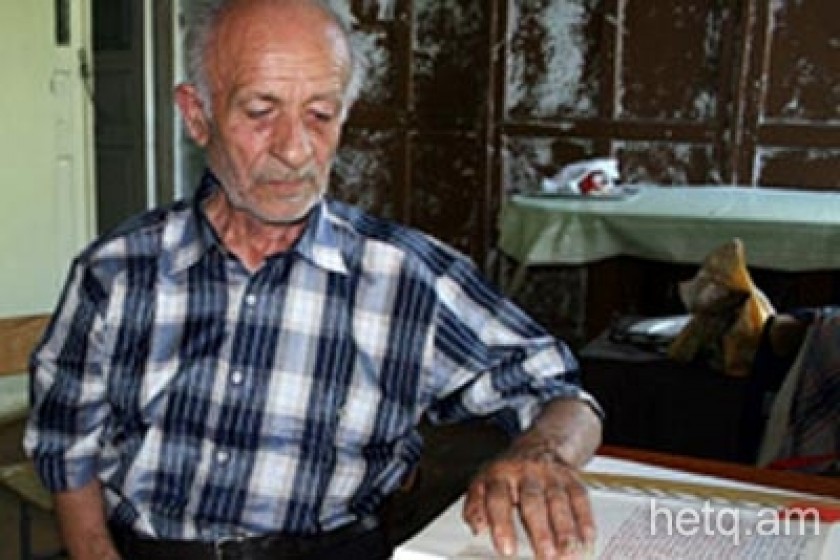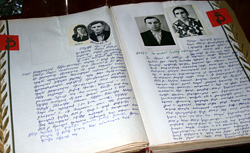
The Chronicles of Togh
If your roots are in Togh, or you are in any way connected to Togh, you can be sure that you are mentioned in Petros Ghahriyan's book. Petros Dayi (Uncle Petros) is the author of the chronicles of Togh, and one of the most respected people in the village. His word is law.
“Whatever Petros Dayi says is final, “ said Vahe Manukyan, who works for the village administration, as he led us to the elder's house.
Vahe appeared in Petros Dayi's book in 2001, when after graduating from university in Yerevan he came back to Togh, to his ancestral home. He says that in recent years many have claimed to be from Togh. But, “We took them to Petros Dayi, and he said that they are not from here.”
When villagers have a conflict, a verdict from Petros Dayi verdict represents the final resolution.
 Not only is Petros Dayi the most educated person in the village, but also he was once a very successful ladies' man, though he has only managed to make two of the women completely happy thus far. His book starts with the two women's photographs and his biography.
Not only is Petros Dayi the most educated person in the village, but also he was once a very successful ladies' man, though he has only managed to make two of the women completely happy thus far. His book starts with the two women's photographs and his biography.
When talking about the women he points to a photograph and says, “This is a photo of my class. This girl was a real beauty, she was my first love, but it didn't work out.” Petros started writing the history of Togh in 1970; before that he had been recording the stories he heard from village elders.
“In 1970 I had some free time and I decided to combine my writings into a book. I am not going to live forever, for villagers to be able to come and check such and such information we me.”
Petros Dayi's book contains the history of Togh, and also records how many Armenians and Azeris lived in the village, who had how many children, who married whom, why they left the village and for how long, whether they ever came back…
According to the chronicles, the Azeris in Togh tried to follow Armenian traditions. They tried to adopt the same lifestyle and create good relations, but trust was always an issue. “When I was five years old, Turks attacked me and my mother on the road to Fizuli. I was taken from my mother's hands and thrown aside, and they took everything we had.”
Petros Ghahriyan is 80 years old today. From 1966 he was the director of Togh's kolkhoz and he does not understand or agree with current government policies. “During those years we didn't have any problems with drinking or irrigation water or with employment. Today they have given the land to the villager and moved to the sidelines. Whoever could manage to get their hands on combines and tractors did, and now when the other villagers ask them for machinery to plow the land, they say we don't have time, we're busy. How can they do something like that? Instead of enriching the state, they enrich a select few, “ said the Togh historian. And though he was a director of an economic institution during Soviet times, he accepts privatization and free market, but with several conditions. He told us that in the past, in order to effectively run Togh's kolkhoz, it was joined with six other village kolkhozes. “There was one kolkhoz, and different local directors.” He believes that even now, when every one owns his or her own land, the government can put a system like that into place. “If before it was hard for a single village to cultivate the land, can you imagine how hard it will be for a single person?” asked the former director of the seven kolkhozes.
When he talks about Togh's young people, Petros Dayi always takes a deep breath. “How did it come to this? This is another disaster.” His book contains the names of thirty young men who he says ought to have gotten married by now. “They say, all we have to live on is our parents' pensions. If we bring a woman home, how will we take care of her?”
 Videos
Videos Photos
Photos
Write a comment